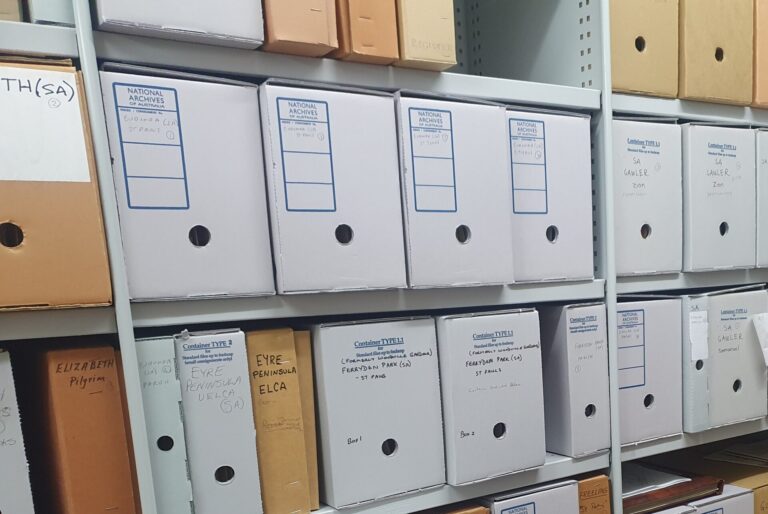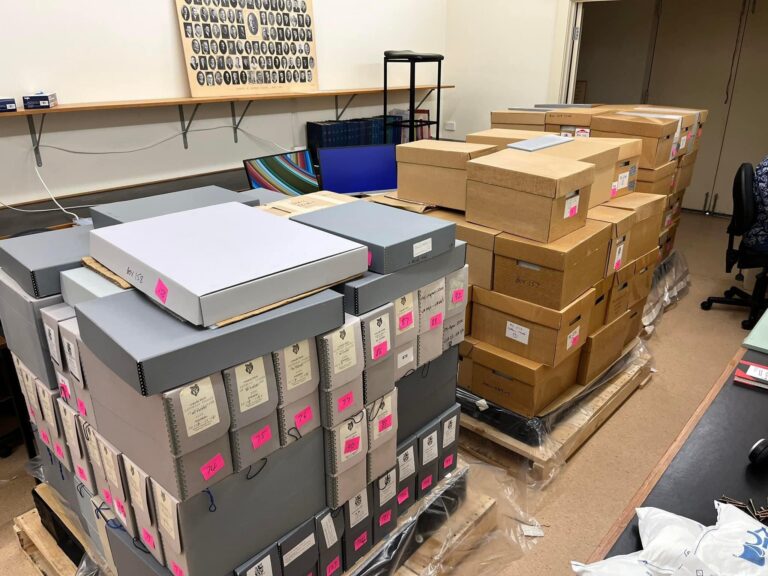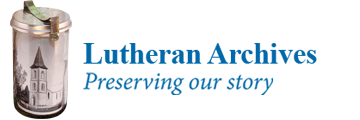Depositing Congregation Records
You’ve made the decision in your congregation to transfer your records to Lutheran Archives. That’s great! What steps do you need to undertake now?
- Get in touch with us to chat about what records you hold, and what of these are permanent records, to be transferred to the Archives.
- Records need to be identified, sorted and labelled. Please label with location/town, the name of the congregation, the type of record (eg Church Council Minutes) and the date range.
- Records need to be listed: template and example listing can be accessed below.
- Email the electronic list to Lutheran Archives, so we can ensure that the records are appropriately described and listed.
- Once you hear back from us, the records need to be labelled and boxed so that they are ready for transport.
If you have any questions at all as you undertake the above, please contact us. We would much rather help you along the way than try and work things out at the end of the transfer.
![IMG_2350[1]](https://lutheranarchives.lca.org.au/wp-content/uploads/2023/12/IMG_23501-768x576.jpg)


resources to assist in preparing a transfer
It might seem like a lot of work, but undertaking the activities at your end as listed above, is excellent stewardship of your resources.
It means you are only sending the records that are required by Lutheran Archives, and that the transfer is seamless. It also means we can commence the detailed work on your collection sooner, ensuring the records are both preserved and accessible. This is excellent stewardship of our resources.
Activities we will undertake are accessioning (processing) the transferred records, rehousing and minor conservation work, digitisation and indexing of your registers, digitisation of photographs, and any other work to ensure your records are discoverable, accessible and preserved for generations to come.
The following are downloadable resources which will assist you in preparing your records for transfer:
- Preserving Our Story Booklet: outlines in detail what records to transfer
- Congregation listing template: an Excel template to list the records you intend to deposit (example sheet included).
- Congregation deposit form: this is the transfer form to complete and send to us when the transfer is ready.
- Registers of Pastoral Acts – A Guide: this will assist in managing core records of pastoral acts.
If you have any questions as you work through this process, please contact us.
your records at lutheran archives
the archive for your church
We are extremely blessed to have an archive that serves the whole church. We are a national archive with international holdings. Many other denominations have a parish or district archive only.
The benefit of this whole church archive is that we see how each piece of our individual ministry or congregation fits together as a whole. We can be encouraged that we are not ministering in isolation but are part of a larger community and network of believers. We draw support and encouragement from this, and see the many ways that God blesses and works with us and through us as his people of the LCANZ.
OWNERSHIP OF THE RECORDS
When you transfer the records of your congregation to Lutheran Archives, you retain the copyright and ownership of those records. Lutheran Archive becomes the custodian of your records.
What this means is we make all the collection management decisions that ensure your records are cared for into the future.
By transferring your records to Lutheran Archives, you are free to concentrate on your current ministries and activities, whilst we concentrate on preserving and facilitating access to your historical ministries.
registers of pastoral acts
This is the most important type of record you create in your congregation. Records of baptisms, confirmations, marriages and burials are the records of an individual’s identity and life story. They are vital records.
Please consider a hard copy, handwritten book to record the details of these pastoral acts.
Why this recommendation?
- Electronic records can be corrupted, accidentally deleted, or altered. Changes are not easily recorded.
- Databases need to be maintained and can become obsolete.
- Handwritten records show personalised care and respect for the event.
FREQUENTLY ASKED QUESTIONS
These are the questions we are most regularly asked when a congregation commences preparation for transferring records to Lutheran Archives. Please do not hesitate to contact us if you have any other questions: we are here to help you!
Some congregations discuss the idea of digitising their content before it is sent to Lutheran Archives. We request that you do not do this. There are numerous reasons for this request.
Firstly, its generally of little value for you to have every item digitised. Ask yourself how regularly you have accessed every item in your holdings? If it has been infrequent, then that should give you confidence that you don’t need a digital copy at this stage. Remember that you will still need to correctly manage, store and preserve that digital content, and see that it remains accessible into the future. Instead you can request digital copies from Lutheran Archives when you need them.
Secondly, and most importantly, is that you likely do not have access to equipment that will safely digitise your records to preservation standards – but Lutheran Archives does! We have an international standard overhead cradle-bed scanner for digitising books, volumes, documents, building plans, and a flatbed scanner for digitising photographs and slides.
Lutheran Archives has a digitisation program to systematically digitise high-use or fragile records. For congregations, this is usually the registers of pastoral acts: these are digitised to a high standard and every entry is indexed onto a database so that we can search by individual name all across our holdings. We will send you a digital copy along with the index once this has been completed. We also digitise photographs. Other items can be easily digitised on request.
No. Unfortunately we do not accept congregations’ weekly bulletins. We do request bulletins and service orders for special services (eg anniversaries, installations)
Information in a bulletin should generally be captured in other records: eg details of events are generally recorded in the monthly/bi-monthly congregation or parish newsletter; details of pastoral acts need to be recorded in the register and summaries are generally recorded in the parish paper; details of giving and tracking against the budget, as well as attendances will be in the AGM reports.
Similarly, we cannot accept video or digital recordings of every single service. We request recordings of special services – installations or rites of farewell, anniversary or commemorative services. You may deposit a small sample of services over a period of time, or a sample of your Pastor’s service during their ministry. We would appreciate a donation to cover the cost of digitisation of these recordings as digitisation is not funded by our budget. We suggest $40 per item.
With today’s technology, it’s easy to take large quantities of photographs, or you might have many physical images that have been developed. That’s great! In general, we do not require large quantities from the same event. Instead, please deposit a sampling to give a snapshot of an occasion; this might include an image of the congregation seated in the pews, a close up of the sanctuary and decorations, an image of key committee members (eg the building committee or church council), and another one or two of the celebratory festivities.
It is important that all images are identified: place, congregation, date (including the year), and names of individuals (where appropriate). Please do not write on physical images; you can use a soft pencil on the back to number the images, and then have an accompanying spreadsheet or word document to record the details. Unidentified photographs are less likely to be accepted into the collection, due to the inability to provide meaningful access.
If you want to keep more images within your congregation, please do!
We already have many copies of the standard hymnbooks used within the LCANZ and preceding synods. Please don’t offer them to us. The same goes with publications such as The Lutheran.
What we would like from your congregation are the items that you have produced yourself, or are particular to your congregation and its story. This could be a film or video of a particular event, or of a group within the congregation – you might have a recording of a Sunday School picnic. We want this!
If you produced a publication – eg a youth magazine or you used a particular liturgy that is not standard within the LCANZ – we want this. We’d also like to know why you chose this alternate liturgy or hymnal.
You might have items that have been used by your congregation for teaching or building the faith. This could be resources in a library, or Sunday School picture rolls, or film strips with scripts. Please check with us first as to if we require them – they will need to be listed for us to check against the existing collection. However, if you have a loans book for items, or an inventory of the collection, this could be deposited as it is unique to your congregation story and shows how the items were used in your ministry.
Financial records:
We require the transfer of annual financial statements and reports, along with details of major financial transactions. This might be the purchase of a pipe organ, piano, commissioning of a new stained-glass window or baptismal font, or purchase of property.
Weekly transactions (including offering details) are not required: you do need to keep these records at your premises however during their auditable timeframe.
Correspondence:
This can be slightly trickier to determine! However, we do not require general day-to-day administrative correspondence – eg arrangements of meetings, bookings of venues etc. We are looking for the correspondence that tells the stories of the people of your congregation and the ministries you undertake.
